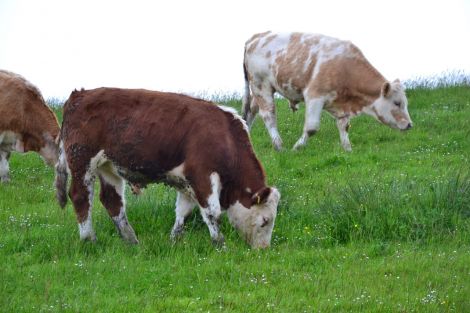News / Livestock owners counting cost of wet weather
CROFTERS and farmers in Shetland have endured a nightmare start to the summer, with a protracted spell of poor weather prompting some to sell off livestock several months earlier than usual.
It is the most sustained spell of bad weather in over 30 years, according to the local National Farmers’ Union (NFU) branch. It started with a very wet winter, leading some to begin feeding sheep a bit earlier than they might otherwise have done.
The cold, wet weather continued throughout the spring, with May a particularly bad month, and NFU Shetland chairman Jim Nicolson thinks the ground “probably never warmed up enough to make a reasonable growth of grass”.
Although some crofters and farmers have now been able to give the grass its first cut of the year, Nicolson is worried about the knock-on impact a shortage of silage could have for sheep and cows in 12 months’ time.
“Looking back 30-40 years, I don’t recall a winter and spring that’s been simply as bad as this coming right through,” he said. “There’s been bad spells but this has probably been the most continuous spell that I can recall.”
Nearly all crofters and most farmers in the islands have other sources of income and “will probably survive because of that”. But Nicolson fears that with a dent in income there “may well be some who will look and say that it’s just not viable to continue”.
He said the Shetland Marts was looking at having another auction for the sake of those keeping cattle who simply don’t have enough grass to feed them.
“It’s not the best time of the year for a sale,” Nicolson said. “The normal buyers are probably not going to be paying as well as might have happened with sales in the back end.
Become a member of Shetland News
“The lamb price nationally has gone down quite a bit. The climatic problems have especially affected Orkney, but even Aberdeenshire has been affected as well. That’s where a lot of the store lambs going out of Shetland will go – we hope things will improve by September/October, but some folk is going to have to sell off shortly. Just because of shortage of feeding.”
Asked whether he was hoping for politicians to intervene, Nicolson said it was important to bring the problem to the attention of Scottish environment minister Richard Lochhead and the parliament’s rural affairs committee.
But because the problem has afflicted crofters and farmers throughout much of Scotland, he doesn’t have high hopes that the government will come in with some form of compensation.
“When you get a localised situation, it’s much easier for government to be able to come and give special assistance. I would hope they’ll come with assistance, but I’m not confident they will,” he added.
Shetland MSP Tavish Scott said he would be pressing the Scottish Government to recognise the “particular difficulties” faced by the islands.
“Our distance from market means that farmers and crofters without grass will have no option but to ship cattle earlier than they normally would,” Scott said. “We need government to act in support of the agriculture industry across the islands.”
Become a member of Shetland News
Shetland News is asking its readers to consider paying for membership to get additional perks:
- Removal of third-party ads;
- Bookmark posts to read later;
- Exclusive curated weekly newsletter;
- Hide membership messages;
- Comments open for discussion.
If you appreciate what we do and feel strongly about impartial local journalism, then please become a member of Shetland News by either making a single payment, or setting up a monthly, quarterly or yearly subscription.










